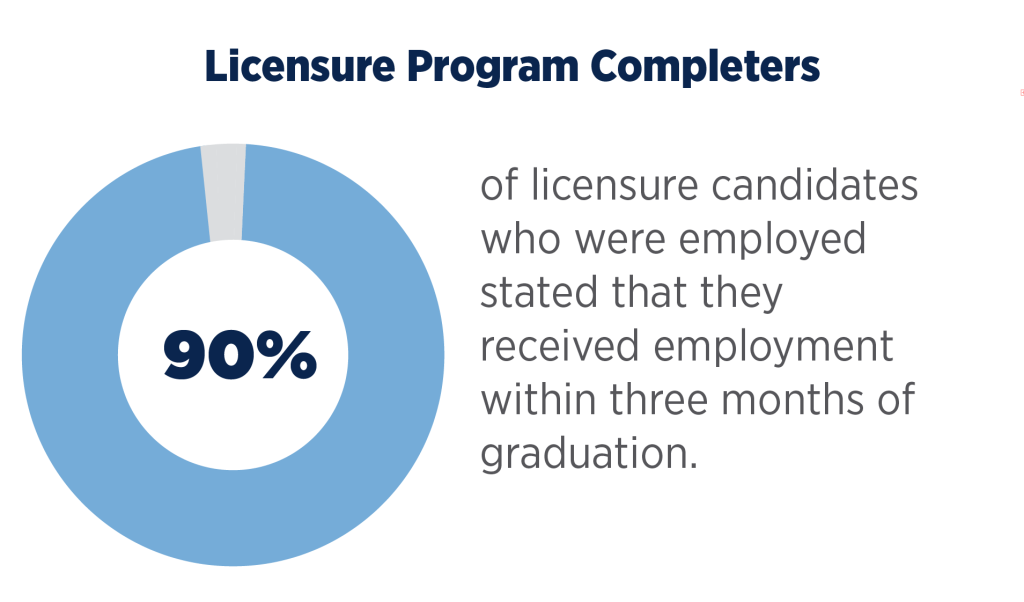CAEP Annual Reporting Measures
Additional Navigation

Annual Reporting Measures
The following reporting measures give a snapshot of Liberty University’s School of Education program impact and its outcomes from the 2023-24 academic year.
Source of measures:
- Recent alumni and employer surveys from graduates in our initial and advanced licensure programs.
- Institutional and national data.
Measure 1 (Initial): Completer effectiveness and Impact on P-12 learning and development (Component R4.1)
Measure 1 (Initial): Completer effectiveness and Impact on P-12 learning and development (Component R4.1)
CAEP R4.1a
Completer Effectiveness (contribute to student learning growth) [N=16]:
Impact Study:
This impact study was designed to address CAEP indicators R4.1, which emphasizes the use of multiple state-supported impact measures related to expected levels of student growth (R4.1a) and using validated observation instruments to determine whether program completers effectively apply the professional knowledge, skills, and dispositions that the preparation experiences were designed to achieve (R4.1b).
Completer participants are recruited for the study each year who are actively teaching full time in K-12 schools. For the 2023-2024 academic year, 16 completers agreed to participate in the study. Of the 16 participants, 9 were undergraduate program completers and 7 were MAT graduate program completers. Participants represented the following licensure areas: 8 elementary education, 2 special education, and 6 secondary education candidates (Math – 2, English – 1, Spanish -1, Music – 1, Social Studies – 1).
The completers are asked to collect data an assessment they gave to their K-12 students for analysis and reflection. The completers were asked to provide two iterations of data from either a classroom test (pre/post), or a computerized test (MAP, iReady, STAR, etc.). They were then asked to chart their student results and analyze the data for students whose scores increased, indicating learning growth. Participants then completed a Qualtrics survey to report their data results. The Qualtrics survey is represented here.
- Name & endorsement program
- Type of assessment (classroom, standardized, school, etc.)
- Number of students taking the assessment
- Number of students who increased scores indicating learning growth
- Number of students who did not show improvement or growth
- Number of students who exceeded goals
Overall data results indicated the following: (N=10 Teachers, N=437 K-12 Students)
- 68% of combined students increased scores indicating learning growth
- 30% of combined students did not show improvement or growth
- 48% of combined students exceeded target goals
CAEP R4.1b
Completer Effectiveness (apply skills in P-12 classrooms that preparation experiences were designed to achieve):
Impact Study Results: K-12 Student Surveys (N=20 Teachers)
- 90% of grades K-12 students provided the highest rating of strongly agreed or agreed that their teachers taught them new things in a way that they could understand.
- 92% of grades 6-12 students provided the highest rating of strongly agreed or agreed that their teachers were knowledgeable in their subject area.
- 86% of grades K-12 students stated that their teacher provided help when they needed it.
- 88% of grades K-12 students provided the highest rating of strongly agreed or agreed that their teacher shows respect to all students.
- 89% of grades 6-12 students provided the highest rating of strongly agreed or agreed that their teacher uses a variety of activities in class.
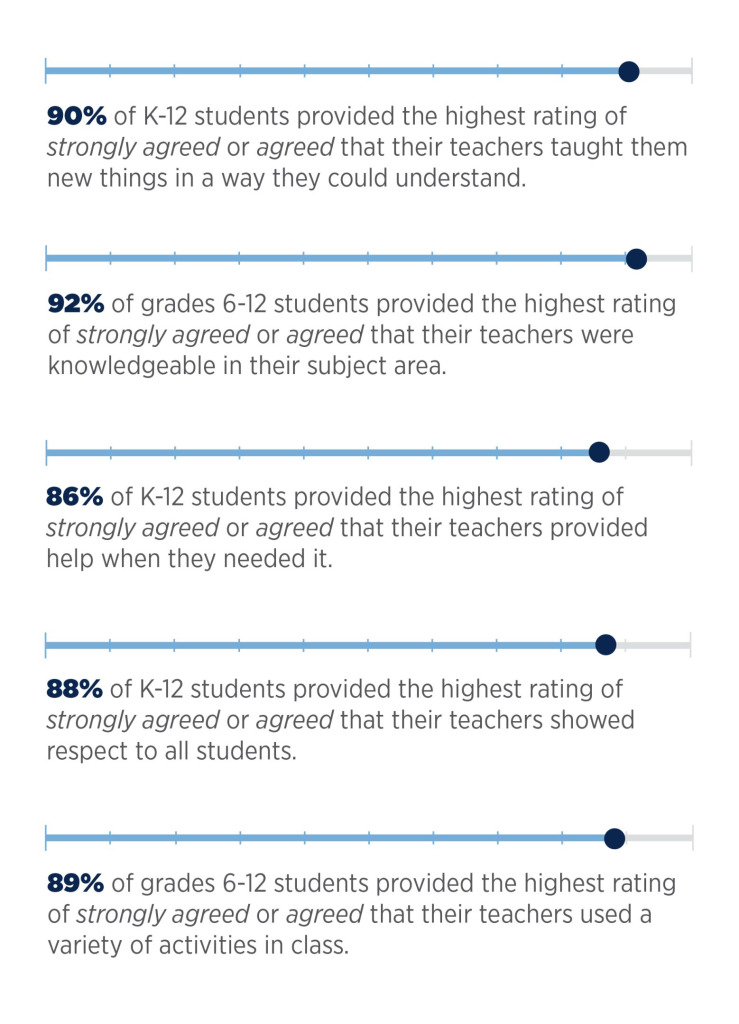
LU Gradate Impact Study 2023-24, case study of beginning teachers
Conclusions: LU School of Education (SOE) completers demonstrated proficiency in their ability to effectively plan lessons that were meaningful and differentiated, deliver effective instruction, and assess their students to analyze learning growth according to the SOE 2023-24 Impact Study.
Measure 2 (Initial and/or Advanced): Satisfaction of employers and stakeholder involvement (Components R4.2 | R5.3 | RA.4.1)
Measure 2 (Initial and/or Advanced): Satisfaction of employers and stakeholder involvement (Components R4.2|R5.3 | RA.4.1)
Satisfaction of Employers:
Data Collection:
R4.2 Employer Survey-SOE Career Fair, VEAC Survey (initial)
RA4.1 Employer Survey-SOE Career Fair, VEAC Survey (advanced)
Employer Survey: SOE Career Fair (2024)
The SOE Employer Satisfaction Survey was developed to measure the success of program completers in the field. Employers who physically attend our spring semester Career Fair are asked to complete this survey. The SOE Employer Satisfaction Survey assesses program completers’ impact in the classroom (e.g. classroom management, instructional practice, content knowledge, professional responsibility, employment retention, etc.). The survey was developed internally by the School of Education. It has fourteen questions which use a Likert scale, and one open-ended question. The Likert scale consists of four levels: Outstanding preparation, Satisfactory preparation, Unsatisfactory preparation, and No evidence of preparation. The second part of the survey is specific to advanced licensure programs containing seven questions, providing data on completers of the admin/supervision, reading specialist, math specialist, and school counseling programs.
Employers in Spring 2024 reported either outstanding preparation or satisfactory preparation regarding initial licensure candidates in the following areas (N=11):
100% reported their satisfaction of program completers’ preparation for their understanding of learner development.
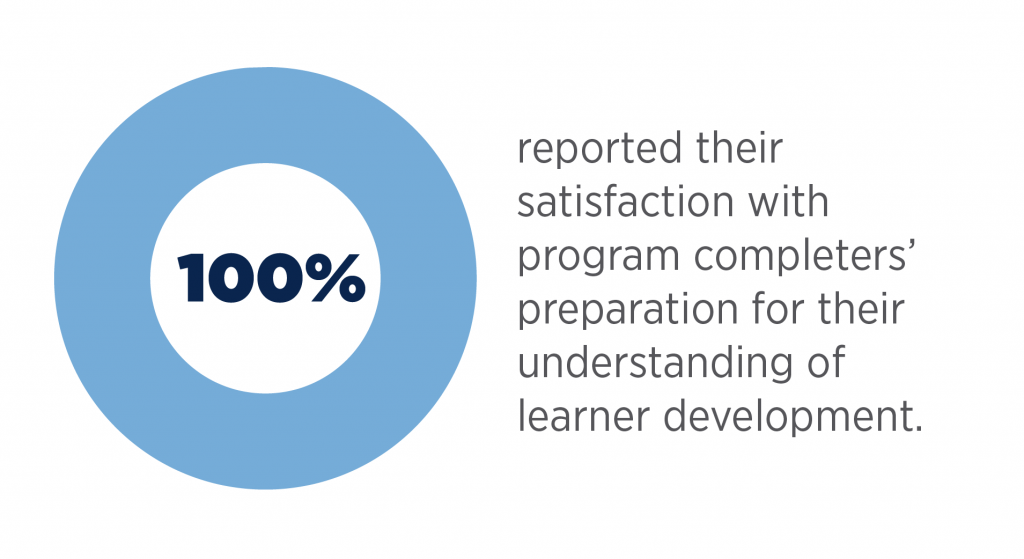
100% reported their satisfaction of program completers’ preparation for their understanding of individual differences and creating inclusive learning environments.
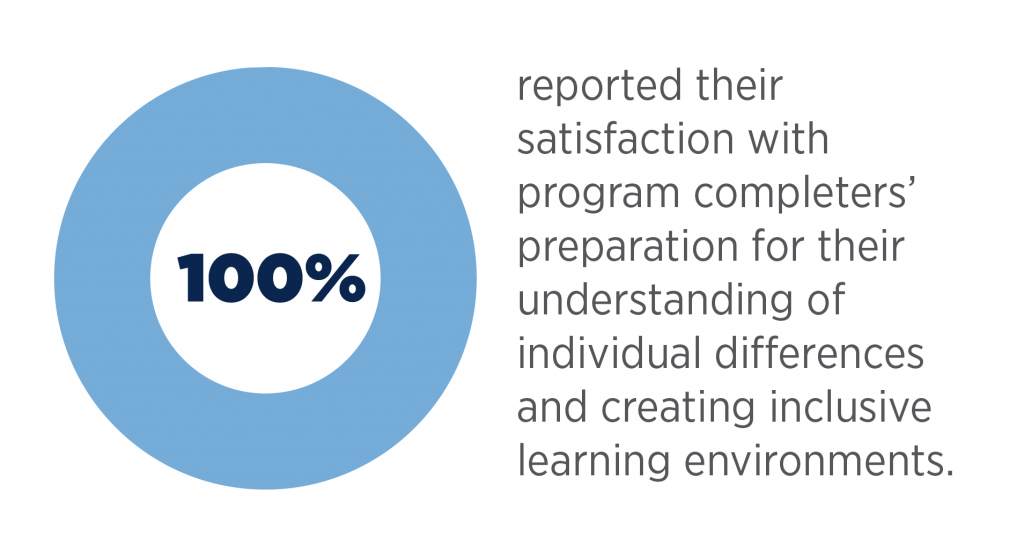
100% reported their satisfaction of program completers’ preparation for their understanding of using multiple methods of assessment to engage learners.
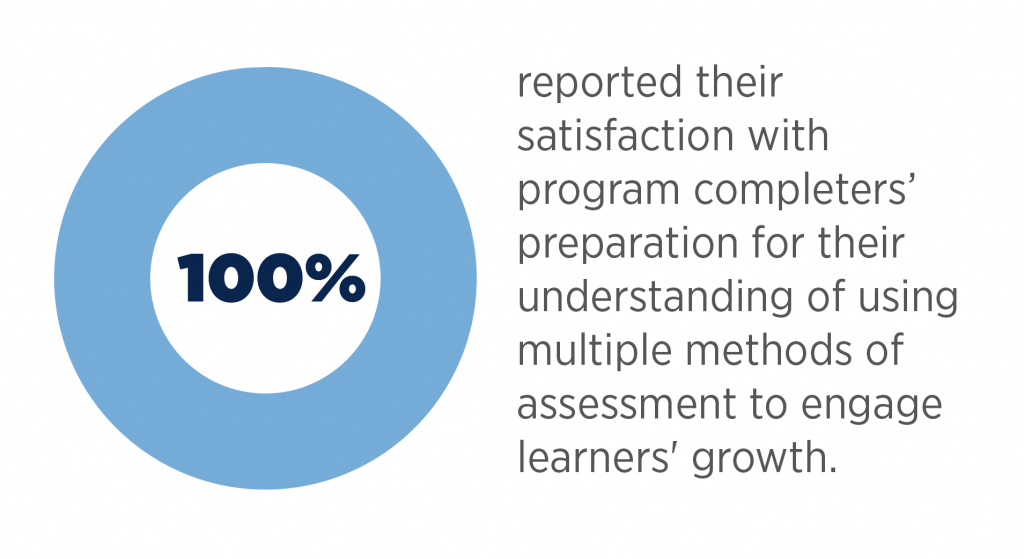
100% reported their satisfaction of program completers’ preparation for their ability to plan instruction that supports every student in meeting rigorous learning goals.
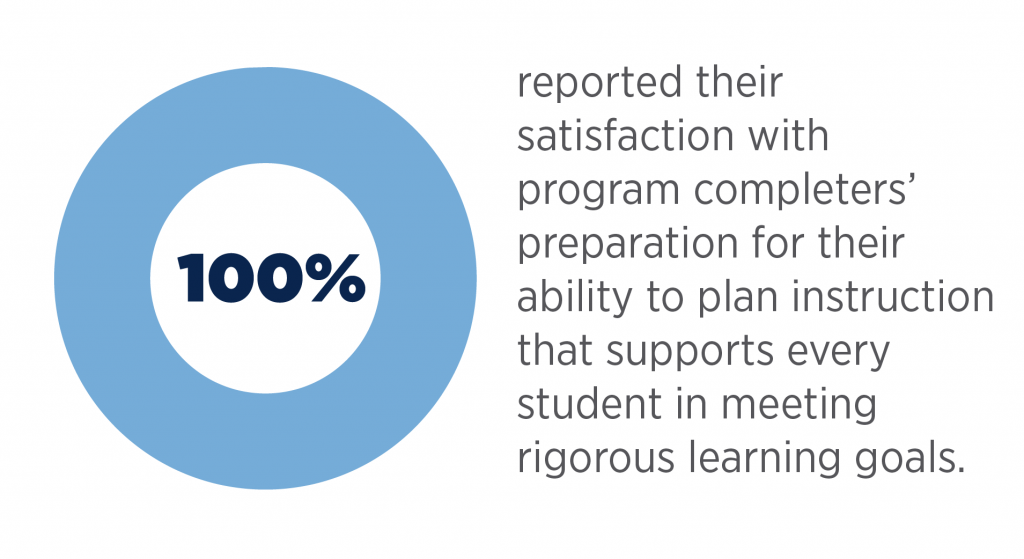
Employer Survey: VEAC Initial & Advanced Surveys (2024)
Employers in Spring 2024 reported either outstanding preparation or satisfactory preparation regarding advanced licensure candidates in the following areas (N=8):
100% reported their satisfaction of program completers’ preparation for their ability to read, understand, create, and communicate data.
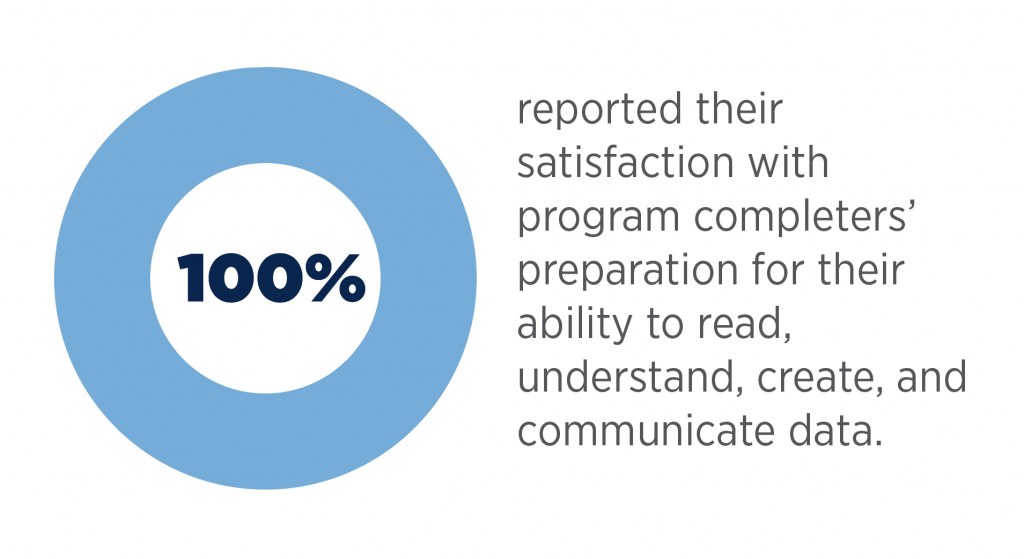
100% reported their satisfaction of program completers’ preparation for their ability to use data to develop supportive and equitable school environments.
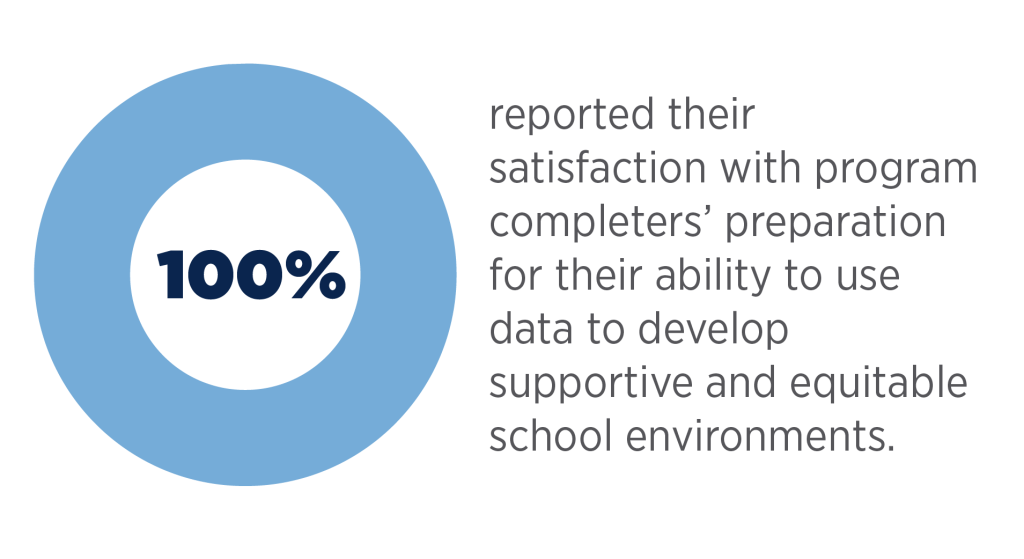
100% reported their satisfaction of program completers’ preparation for their ability to apply professional dispositions, laws and policies, codes of ethics, and professional standards.
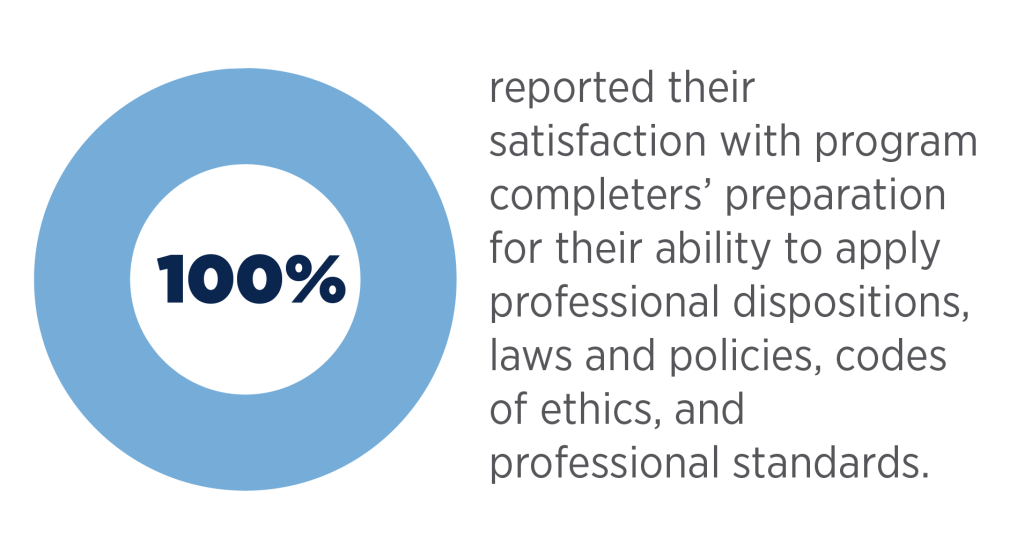
Employer Survey: VEAC Initial & Advanced Surveys (2024)
Initial Licensure Employers in Spring 2024 reported a:
3.5 out of 4.0 on the teacher’s commitment to professional ethics, collaborating and communicating effectively, and taking responsibility for and participating in professional growth that results in enhanced student learning. (N=135)
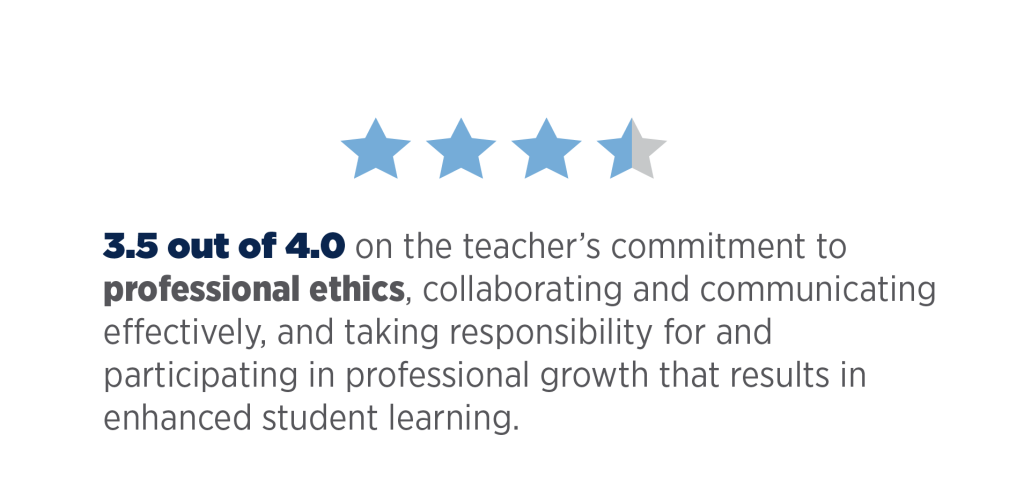
4.5 out of 5.0 on the teacher’s overall extent to which they were ready to meet the needs of students in the school. (N=135)
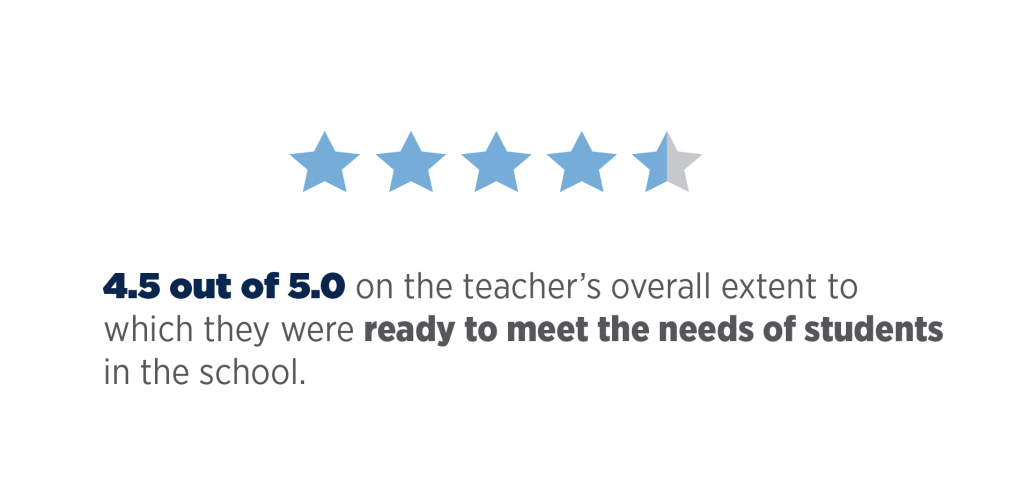
Advanced Licensure Employers in Spring 2023 reported a:
3.5 out of 4.0 on the school administrator’s supervision and leadership skills to promote a working and learning climate that is safe, secure, and respectful of a diverse school community. (N=15)
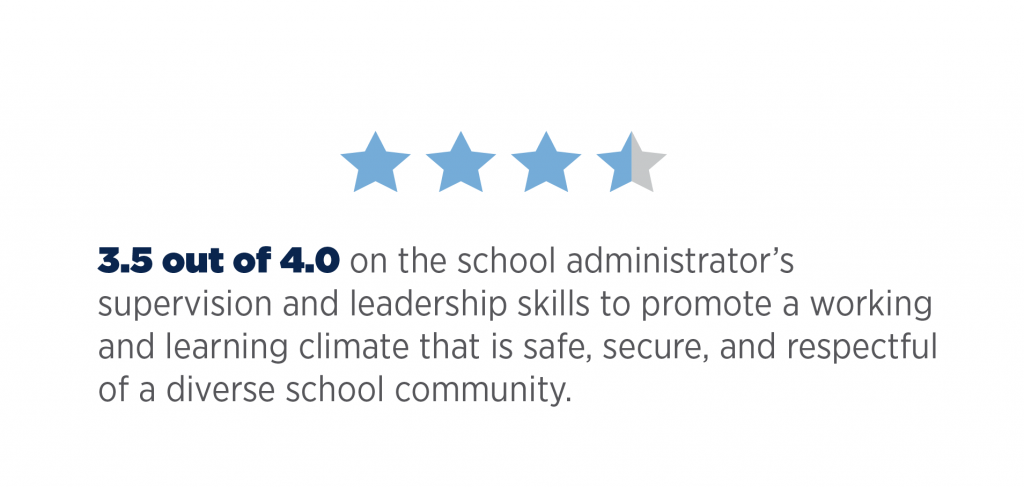
3.75 out of 4.0 on the school counselor’s ability to model school counseling professionalism, including legal and ethical considerations. . (N=37)
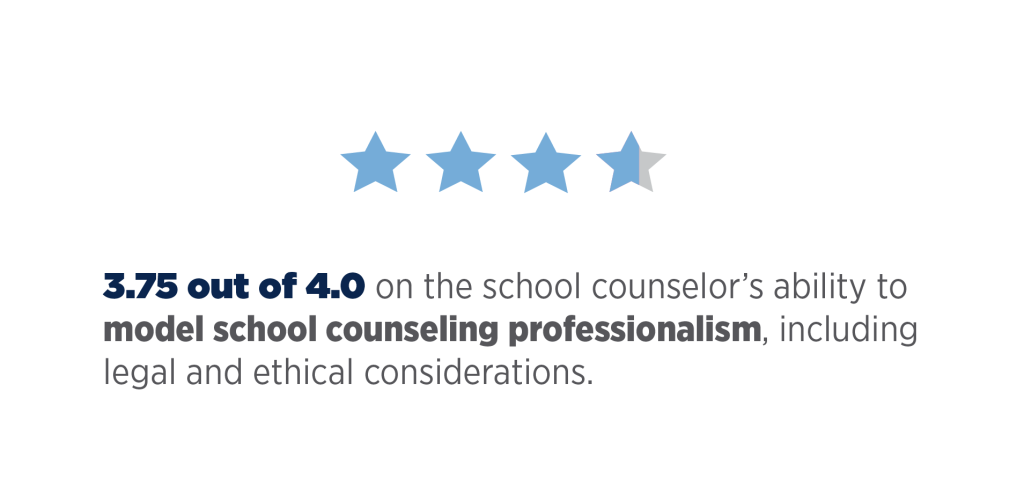
A link to the full Employers Survey Results can be seen at LU Employer Surveys Spring 2024.
Stakeholder Involvement (R5.3)
Partner Satisfaction Survey – (Collected every Spring)
The mission of the School of Education’s Partnership Program is to provide a forum for collaboration between the School of Education (SOE) and its education partners to ensure a mutually beneficial relationship for all involved in the Educator Preparation Program (EPP).
SOE Partnership Model
The SOE collaborates with P-12 school partners to design and refine field experiences that reflect diverse settings to ensure that candidates demonstrate their developing effectiveness and positive impact on all students’ learning and development. Field experiences, including technology-enhanced learning opportunities, are structured to have multiple performance-based assessments at key points within the program to demonstrate candidates’ development of the knowledge, skills, and professional dispositions, that are associated with a positive impact on the learning and development of all P-12 students. Liberty partners agreed that the partnership is mutually beneficial according to the survey.
Full survey results can be found at LU Partnership Satisfaction Survey.
Highlights from the Partnership survey:
- 100% of partners surveyed stated either strongly agreed or agreed that host teachers/educators and university supervisors are highly qualified.
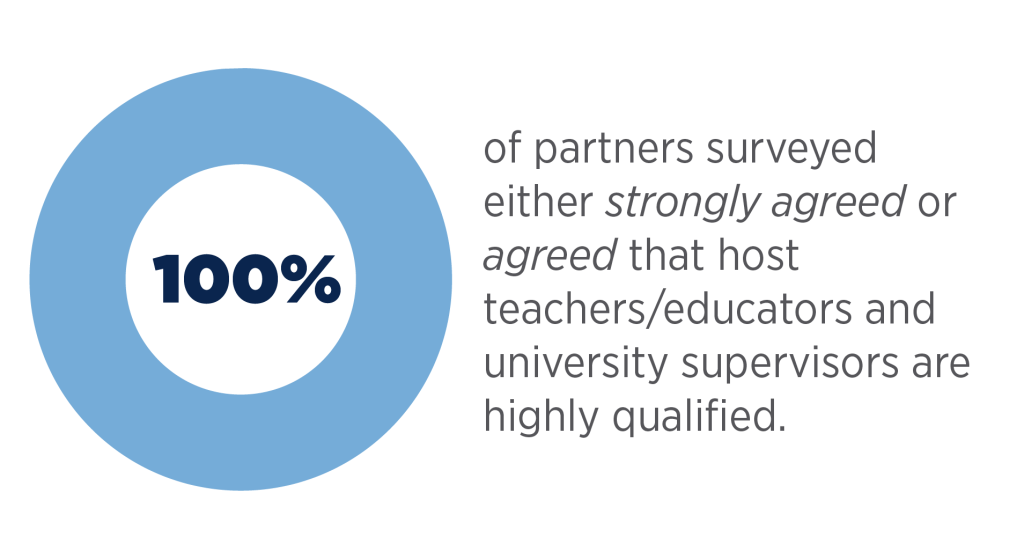
- 97% of partners surveyed stated either strongly agreed or agreed that the selection criteria for choosing the host teacher/educator is clearly defined.
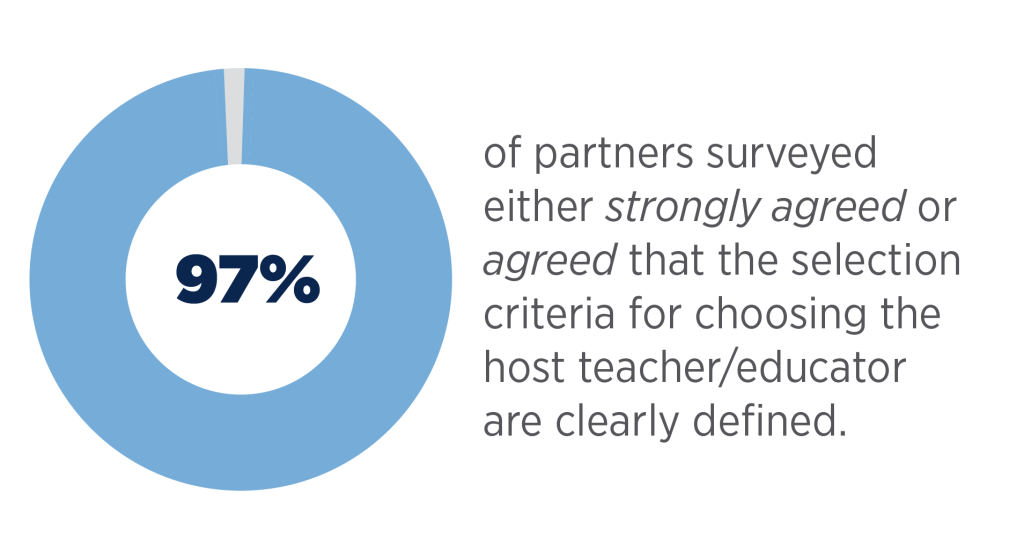
- 100% of partners surveyed stated either strongly agreed or agreed that the LU School of Education is accessible and responsive to partner questions or concerns
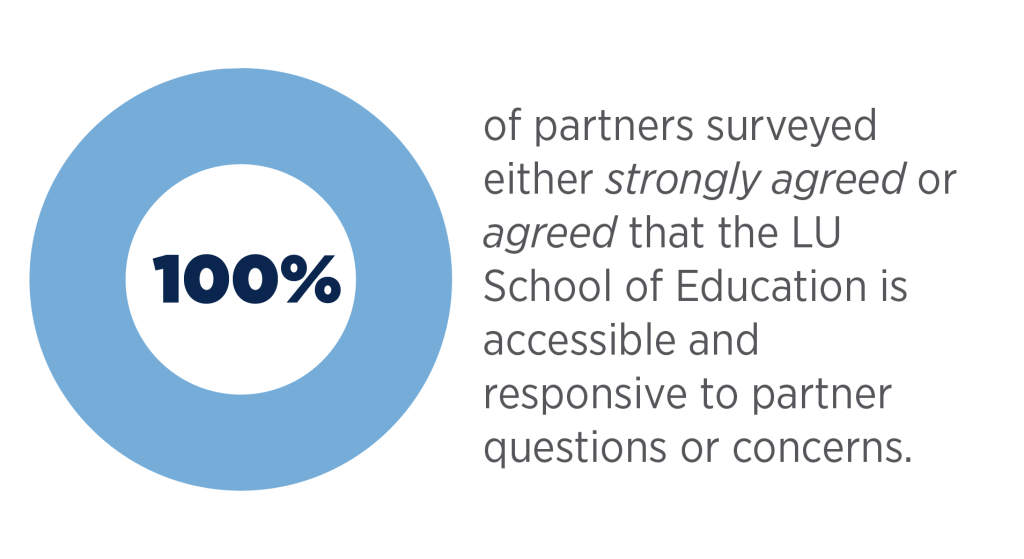
- 93% of partners surveyed stated either strongly agreed or agreed that their partnership with the LU School of Education is mutually beneficial
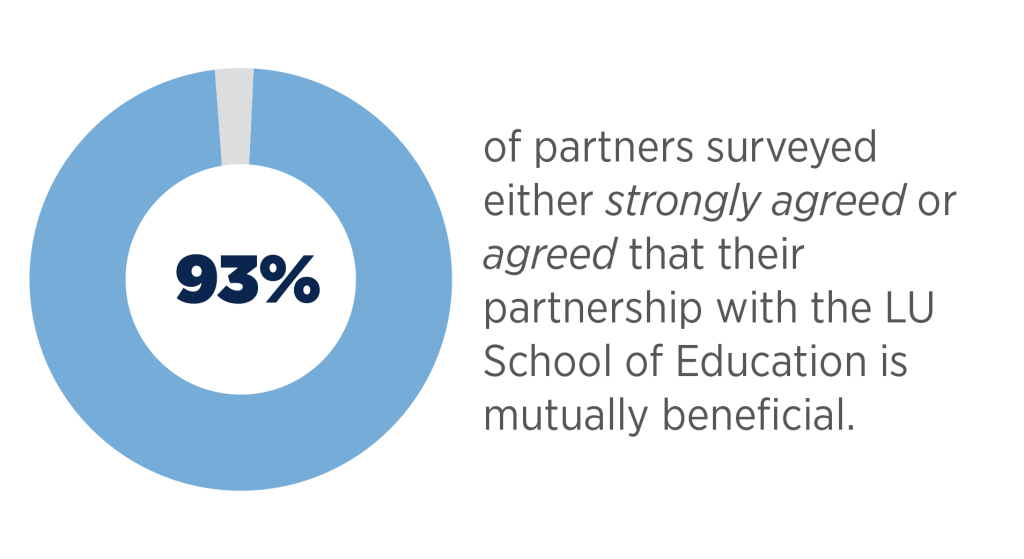
The School of Education maintains a partnership website which provides partners with links to events and resources related to their interests.
Advisory Councils
The School of Education has four advisory councils. Two of them relate directly to external partners and two of them relate directly to internal partners across LU. These councils meet twice a year during the Spring and Fall semesters.
CAC: Community Advisory Council – External
- The Purpose of this group is to provide a forum for collaboration between the School of Education (EPP) and its local education partners to ensure a mutually beneficial relationship for all involved. (Central Virginia area)
- The CAC meets once each semester, in October and March
- The membership consists of school personnel from local school systems and SOE Faculty
GAC: Global Advisory Council – External
- The purpose of this group is to provide a forum for collaboration between the School of Education and its distance education partners to ensure a mutually beneficial relationship for all involved in the Educator Preparation Program. (outside the Central Virginia area)
- The GAC meets once each semester, in October and March
- The membership consists of school personnel from school systems outside of Central VA and SOE Faculty
AAC: Advanced Advisory Council – Internal
- The purpose of this group is to provide a forum for collaboration between the School of Education and program directors for advanced programs within the School of Education.
- The AAC meets once each semester, in October and March
- The membership consists of program directors for the Administration & Supervision, School Counseling, Reading Specialist, and Math Specialist programs.
SAC: Secondary Advisory Council – Internal
- The purpose of this group is to provide a forum for collaboration between the School of Education and program directors for secondary content programs from other Liberty University Schools.
- The SAC meets once each semester, in October and March
- The membership consists of program directors from other LU Schools: College of Arts & Sciences, School of Behavioral Sciences, School of Business, School of Communication & the Arts, and the School of Music.
Measure 3 (Initial and/or Advanced): Candidate competency at program completion (Component R3.3 | RA3.4)
Measure 3 (Initial and/or Advanced): Candidate competency at program completion (Component R3.3 |RA3.4)
The Candidate Preservice Assessment Student Teaching (CPAST) is a proprietary formative and summative assessment implemented during the student teaching experience (i.e., the culminating field experience of a teacher preparation program). Because the assessment is used as a coaching tool, it is used twice – once midway through the student teaching practicum and once at the end. The data from the CPAST assessment allows for national comparison. The rubric contains levels 0-3.
CPAST Score Results: 2023-24
Fall 2023 Term
- Regarding teaching pedagogy, LU candidates scored a mean of 2.68 compared to the national mean of 2.45 (out of 3.0)
- Regarding candidate dispositions, LU candidates scored a mean of 2.79 compared to the national mean of 2.73 (out of 3.0)
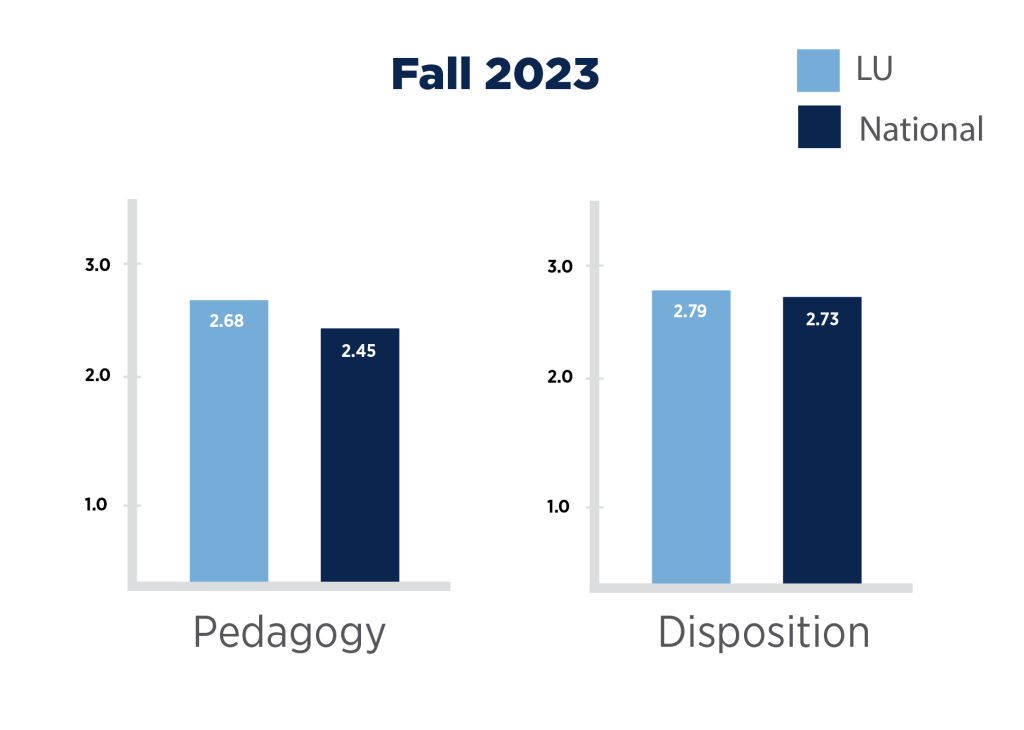
Spring 2024 Term
- Regarding teaching pedagogy, LU candidates scored a mean of 2.62 compared to the national mean of 2.44 (out of 3.0)
- Regarding candidate dispositions, LU candidates scored a mean of 2.74 compared to the national mean of 2.68 (out of 3.0)
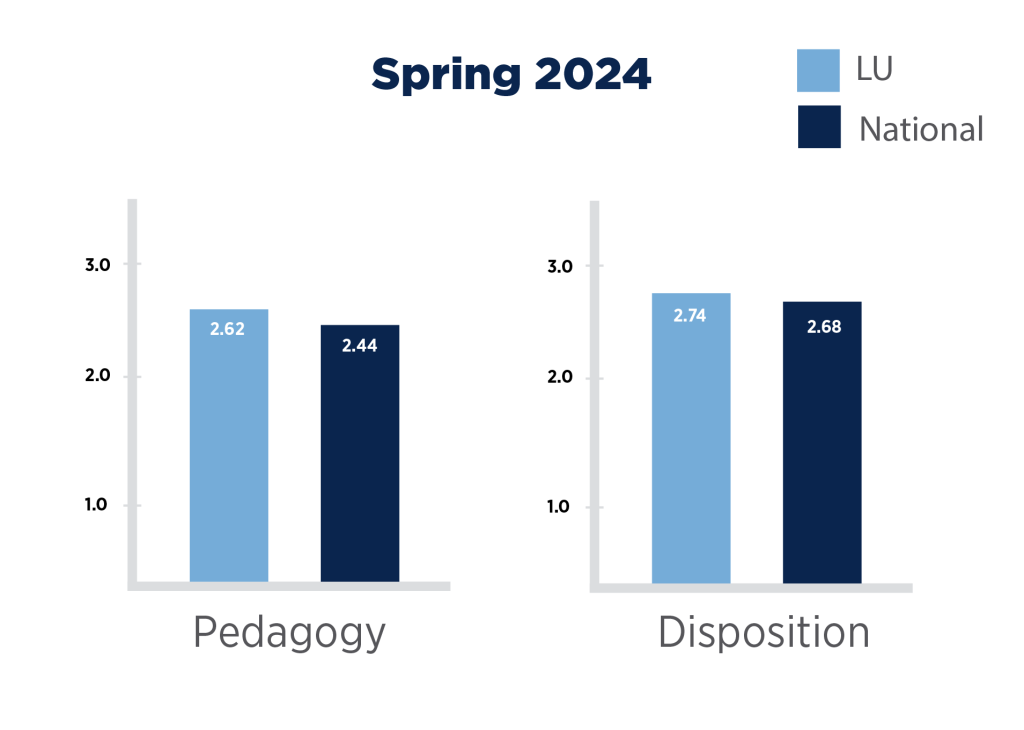
Item highlights (Fall 2023 Final): N=370
- Row C – Assessment of P-12 Learning, LU candidates scored a mean of 2.67 compared to the national mean of 2.43 (out of 3.0)
- Row I – Safe & Respectful Learning Environment, LU candidates scored a mean of 2.81 compared to the national mean of 2.73 (out of 3.0)
- Row S – Collaboration, LU candidates scored a mean of 2.85 compared to the national mean of 2.79 (out of 3.0)
Item highlights (Spring 2024 Final): N=331
- Row C – Assessment of P-12 Learning, LU candidates scored a mean of 2.67 compared to the national mean of 2.45 (out of 3.0)
- Row I – Safe & Respectful Learning Environment, LU candidates scored a mean of 2.72 compared to the national mean of 2.70 (out of 3.0)
- Row S – Collaboration, LU candidates scored a mean of 2.81 compared to the national mean of 2.76 (out of 3.0)
The results of the CPAST student teaching assessment above reveal all initial licensure candidates’ final assessment results. In both semesters for the 2023-24 academic terms, Liberty University candidates consistently scored above the national average for this culminating assessment for teaching performance. The detailed report for this assessment can be found at LU Student Teaching Assessment.
Advanced Programs RA3.4
The EPP has developed an Advanced Internship Assessment (AIA) for each of the four endorsements in the advanced licensure program:
- AIA-AS Administration/Supervision
- AIA-MS Math Specialist
- AIA-RS Reading Specialist
- AIA-SC School Counselor
The Advanced Internship Assessment (AIA) is used during the final internship course for advanced licensure candidates to assess their performance on using the standards of their area of specialization in a school setting. Overall, Liberty University advanced program candidates consistently scored Acceptable (level 2) or at Target (level 3) for each of the CAEP six professional skills assessed within the Internship Assessment. The detailed report for this assessment can be found at LU Advanced Programs Internship Assessment (AIA).
Percentage of LU candidates in Advanced Programs scoring at or above target for CAEP Professional Skills on Internship Assessment:
99% on Application of professional dispositions, laws and policies, codes of ethics and professional standards appropriate to their field of specialization.
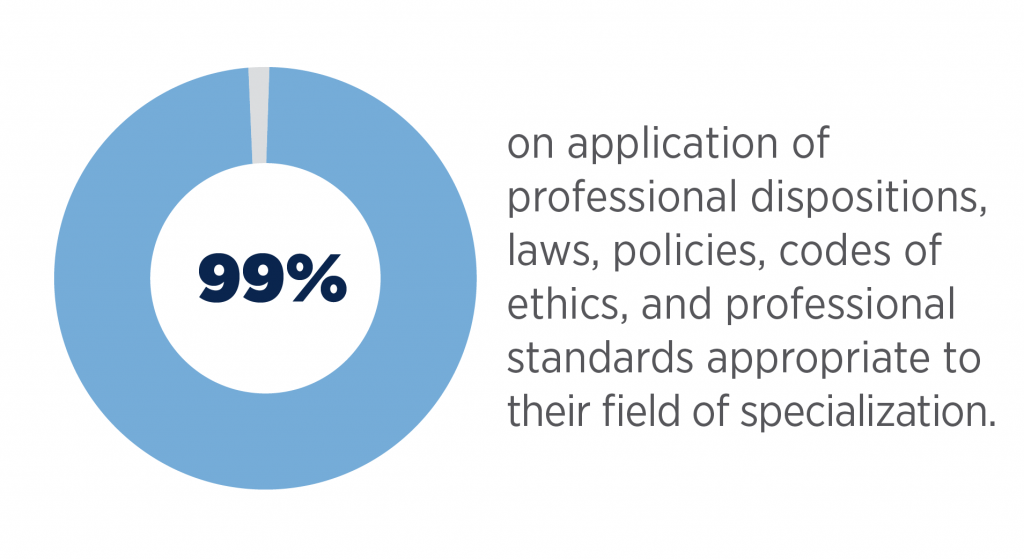
99% on Applications of data literacy.
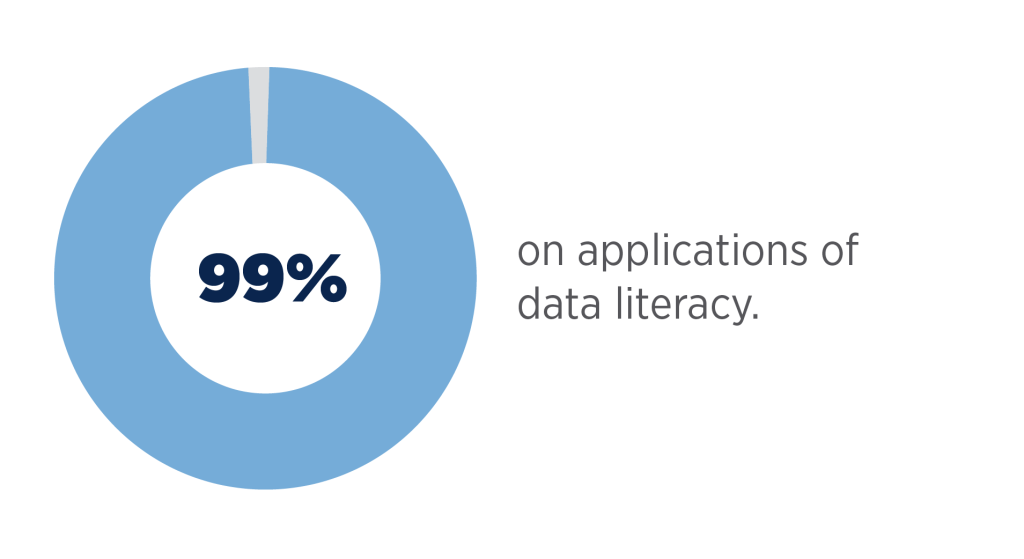
99% on Professionalism.
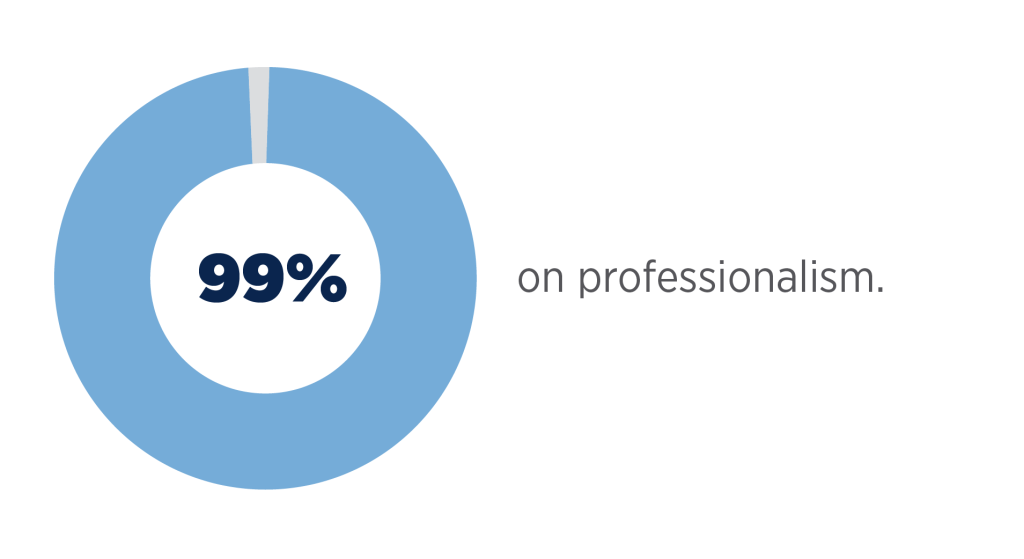
Measure 4 (Initial and/or Advanced): Ability of completers to be hired in education positions for which they have prepared.
Measure 4 (Initial and/or Advanced): Ability of completers to be hired in education positions for which they have prepared.
The Alumni Survey assesses the achievement and success of recent graduates from Liberty University. Topics on the survey include job placement, job relevance, and overall satisfaction with the program. There are 23 questions on the survey for all graduates which pertain to employment, contact with the university, and open feedback. There are 7 questions (rating CAEP skills) specific to initial teacher licensure in the School of Education, and 14 questions (rating CAEP 6 professional skills) specifically for advanced programs.
The Alumni Survey is completed in the fall semester post-graduation and is used post-graduation in years 1, 5, 10, and 20. The Office of Alumni Relations, the Office of Institutional Effectiveness and Research and the School of Education use this assessment to measure the success and satisfaction of program completers. The detailed report for the alumni survey data can be found LU Alumni Survey Fall 2023 Gainful Employment.
LU Alumni Survey Fall 2023:
Advanced Programs: 91% of survey respondents who were employed, stated their current position was directly related or somewhat related to their education degree received from Liberty University.
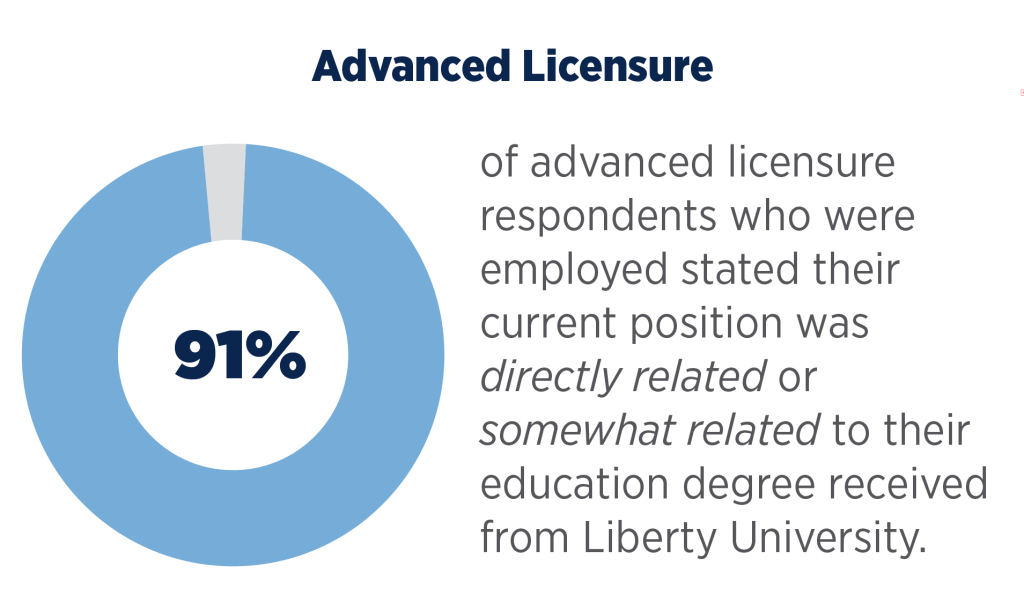
Initial Programs: 88% of survey respondents who were employed, stated their current position was directly related or somewhat related to their education degree received from Liberty University.
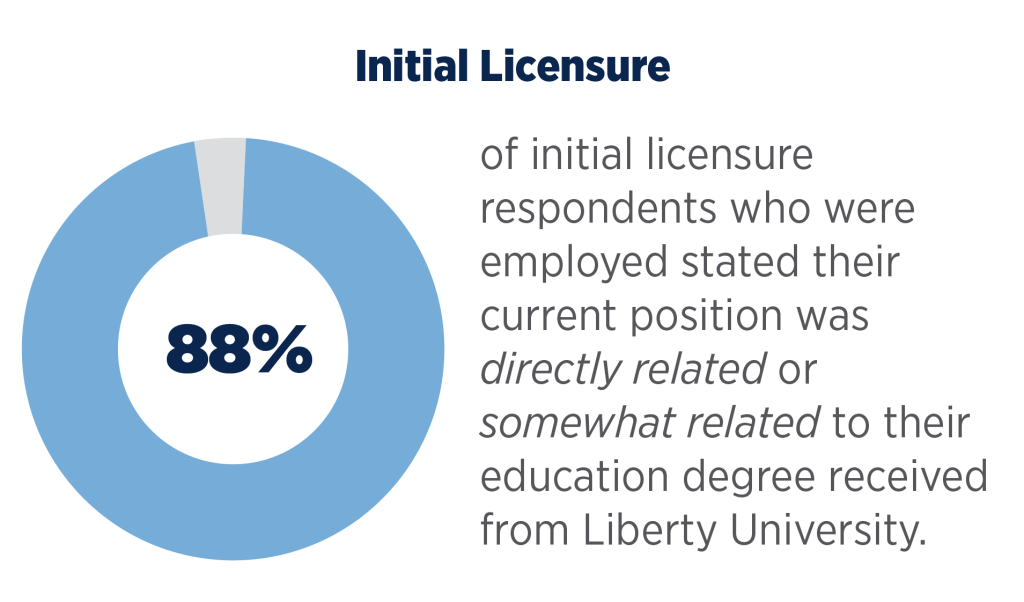
56% of initial program completers stated that their most recent degree from Liberty resulted in a raise or promotion.
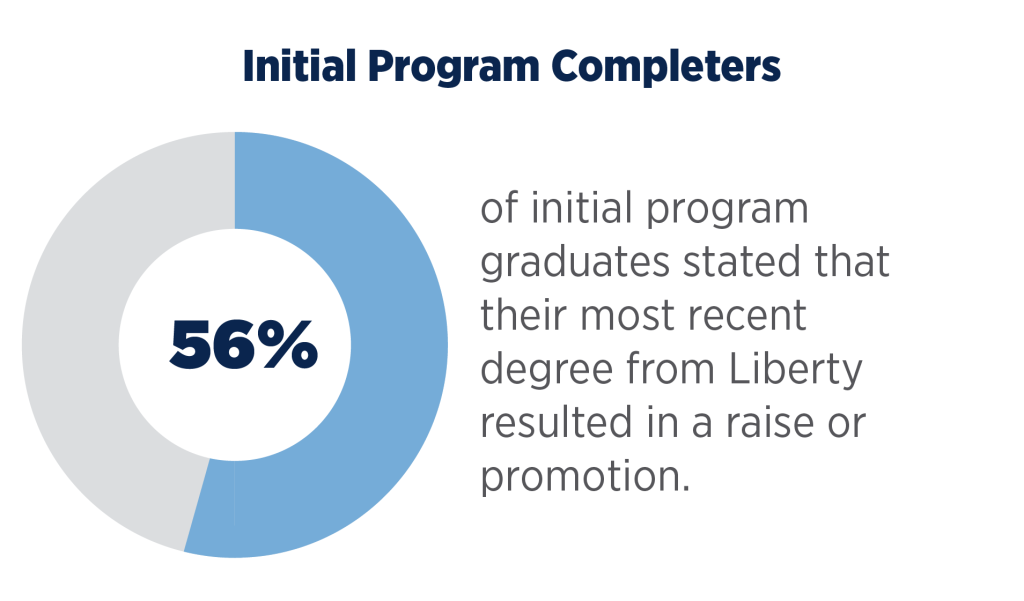
72% of advanced program completers stated that their most recent degree from Liberty resulted in a raise or promotion.

90% of licensure candidates stated that they received employment within three months after graduation.
